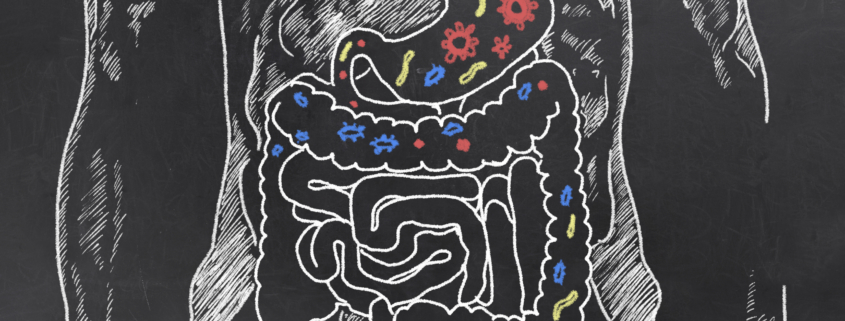Digesting Emotions: What’s Gut Health Got to do with it?
According to ancient Taoist philosophy, we literally digest emotions. We have to process them. Starting in the mouth, we take in information from the outside world through taste and chewing. In the stomach and small intestines, we break stuff apart and sort through it to understand what’s there. Then, in both the small and large intestines, we differentiate what to assimilate and what to discard. We acknowledge this concept in our language: upsetting emotions can leave a bad taste our mouths or we simply can’t stomach something.
Scientific knowledge validates ancient wisdom. We are beginning to understand the profound role of gut neurotransmitters and gut flora in influencing emotions. The science on the gut-brain connection articulates how stress and emotions influence digestion, and how imbalances in the digestive tract can also impact mood.
Along this loop, the brain sends signals, promoting digestive secretions and gut motility. It’s why thinking about lemons can make you salivate. The brain also communicates information about our emotional state, which is one of the reasons that acute stress alters appetite and tends to redirect energy away from digestion and toward other, more immediate survival mechanisms. Digestion is what we do in a relaxed state.
The brain in our guts, called the enteric nervous system sends signals to our upper brain about food and our environment. The gut (and gut flora) amplifies emotional signals and sends them along to the brain, which we then store as “gut feelings.”
To me, some of the most interesting and complex elements of digestion take place in the small intestine. There, we literally have to sort through the contents of what we’ve ingested, and decide what is safe and what is useful, and what is harmful or unneeded. Neurologically and immunologically, we essentially have to learn what is there on a very refined level, and choose what to allow in and what to send out.
Translate this to the emotional plane. We can see how essential it is to digest information and to decide what is useful and meaningful. It’s also important to identify what does not serve us or is no longer useful so we can release it. When this process is going well, we are nourished by life. We have what we need and we don’t hold on to things unnecessarily.
However, this process can become overwhelmed or impaired. Often times, we are simply being exposed to more than we can process or too much that feels unpalatable in the world or in our personal lives. In other situations, there can be an actual impairment in physiological digestion, such as from inflammation or gut flora imbalances, among many causes. This physiological impairment can impact us emotionally and stall our overall ability to process everything. Sometimes, it’s both the chicken and the egg.
With impaired digestion (either physiologically or emotionally), we may not be able to take in enough of the good stuff nor may we be as effective at letting go of the yucky stuff. Our bodies can become confused about what to keep and what to get rid of. Sorting and transport mechanisms can go haywire. The integrity of our boundaries (such as the intestinal barrier) can become compromised. Or we can have issues with motility, which might feel like we are processing things too fast or not fast enough. It might look like this:
- Not absorbing enough, leading to depletion. This can happen when we don’t have the resources to digest well, when our bodies reject things quickly before there is time for proper sorting, or when we just don’t get enough of what we need.
- Stagnating, feeling congested, full or stuck. This can happen when we aren’t sure of what we need to let go of or how to let go of it. Sometimes we hold on because there is a lot to process, or we might be fearful of letting go.
- Taking in too much, such as too much fuel, the wrong fuel, or things that are toxic or overwhelming to our systems. This can happen when there is a communication breakdown between the gut, the brain, or with other systems in the body, leading to a distorted sense of what is nourishing for us. It can also happen when barriers are compromised, and we can become inundated by what was meant to stay on the outside. The inevitable response to that breach is alarm and hyper-vigilance.
In terms of digestive symptoms, this could manifest in lots of different ways, such as bloating, constipation, diarrhea, abdominal discomfort, reflux, or malabsorption. It could also show up as leaky gut, and the various systemic issues that can come along with it, such as autoimmunity. Or it could manifest as emotional overwhelm, brain stress or fatigue, without any noticeable digestive symptoms at all. I’m definitely NOT saying that these symptoms always have an emotional origin. However, I do think it’s worth an inquiry.
In the context of digestive distress or emotional overload, it’s probably a sign to slow down and simplify. Strong digestion and true nourishment takes place in a relaxed state. It’s how we can absorb the good stuff of life and feed our well-being and sense of wholeness. It’s also how we know what doesn’t ultimately serve us.
Fortunately, there’s a treasure trove of tools that can help facilitate the digestive process, be it physiological digestion or emotional digestion. In my practice, I find that some of the most valuable tools include those that intersect with both the nervous system and the digestive system. This includes diaphragmatic breathing, visceral massage and herbs that support the digestive nervous system.
- Diaphragmatic breathing massages our abdomen with each breath, creating an opportunity to make contact with and to move emotions that have been stored in the gut. Diaphragmatic breathing, also called “belly breathing,” supports physiological digestion as well because it promotes the parasympathetic nervous system, which stimulates digestive secretions and enhances digestive motility.
- Touch enhances this process, whether it’s your own or from a practitioner who is skilled in hands-on visceral techniques, such as Chi Nei Tsang organ massage or visceral manipulation.
- Herbal supports might include those that relax the nervous system, but which also have a digestive effect. Typically these include bitter and/or aromatic herbs. Although each person will have their own specific needs, some of my general favorites are chamomile, lemon balm, lavender, vervain, motherwort, catnip, and fennel. Several of these, such as chamomile, lavender and lemon balm, are palatable in tea. For a synergistic blend, Farmacopia’s Rest & Digest tincture formula contains several of these herbs and more.
In summary, emotional digestion is not just a phenomenon of the brain. It is also a phenomenon of the digestive system. These are just a few of the tools that can help soften and aid in the intricate process of digesting emotion. Because it is a loop, supporting on the physiological level of digestion can impact the emotional level, and vice versa.
If this topic is alive for you, I suggest check out my blog on tools for rewiring stress responses. If you need more help sorting it out, this is how to find me.
Important Disclaimers: This blog is educational and it does not constitute or replace medical advice. The information contained here has not been evaluated by the FDA. Consult your healthcare provider for any interventions that might be appropriate for your personal needs and circumstances, especially if you have any medical conditions, are taking medications, or are pregnant or nursing, or if you are acutely ill. The use of the terms you, I, our does not imply that this represents any form of advice. Dr. Bridget Somine is an independent naturopathic health care provider at Farmacopia and does not receive any financial compensation for purchases there and has no direct affiliation with any herb or supplement company.



